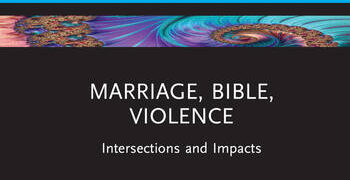New book about Marriage and Violence in the Bible and Today

In this post, we feature the book, Marriage, Bible, Violence: Intersections and Impacts (Routledge, 2023), which is out this week! The book is in the Routledge Focus series Rape Culture, Religion and the Bible. The authors are community activist Saima Afzal, who holds an MA in Religion and Public Life from the University of Leeds, and Johanna Stiebert, incoming director of the Centre for Religion and Public Life. We asked them a few questions…
How has this book come about?
The two of us have been friends for some years. We first met at the University of Leeds when Saima was completing her MA, and we have collaborated on a variety of campaigns focused around preventing gender-based violence. Each of us identifies as both scholar and activist, even if in our working lives, these carry different emphases. We share a conviction that activism benefits from a basis in research and research benefits from having impact on positive social change. Saima has a wealth of practitioner experience from working in local government, child protection, and as National Crime Agency-registered expert witness, and Independent Member of the Lancashire (UK) Police Authority, with a national Equality, Diversity, and Human Rights portfolio. Johanna is a biblical scholar with particular interest in topics of gender and gender-based violence. She co-founded and co-directs The Shiloh Project, which explores the intersections of rape culture and religion. Together we co-direct (with researcher-activists Mmapula Kebaneilwe and Emma Tomalin) a Community Interest Company (CIC) founded by Saima, called SAS Rights. This CIC is the primary vehicle for much of our activist work. The book is our co-production and an attempt to combine our perspectives as researchers and as activists to explore the multiple ways the topics of ‘marriage’ and ‘violence’ are enmeshed. We use the Bible as our focus for demonstrating some of these intersections and the impact they have on real lives.
The book, while succinct, took longer to write than we anticipated – not least, because of the Covid-19 pandemic. But the harder it was for us to find time for writing, the clearer the importance of this book became. We could see the harm and damage caused by instrumentalising sacred texts to afflict real people, with women and girls disproportionately represented among victims and survivors. Resisting this on multiple fronts, including with research-based arguments, drove us on.
What is the key argument that the book develops?
‘Marriage’ and ‘the Bible’ are both prominent themes in day-to-day contexts, including in popular culture. One ideology very prominent in claims about ‘biblical marriage’ is complementarianism. One purpose of this book is to explore the disjuncture between, on the one hand, complementarian accounts of biblical marriage and, on the other, intersections of marriage and violence in texts from Jewish and Christian Scriptures.
We challenge authoritative complementarian claims to the Bible’s allegedly clear and unequivocal directions on marriage and refute these claims with analysis of the muddled and often violent depictions of marriage in the Bible itself. We focus on the influential pronouncements on ‘biblical marriage’ by the US Family Research Council and Council for Biblical Manhood and Womanhood, and we analyse such key biblical texts as Genesis 1–3, Malachi 2, and Ephesians 5.
What insight does the book provide into the relationship between religion and public life?
The book is based on research and analysis of biblical texts, yes. But in the course of this, we are mindful of and remind readers how and why these have real-life repercussions: that is, because recourse to the authority and ‘plain meaning’ of the Bible has had and continues to have impact on real people’s lives. Sometimes, this impact is violent and traumatic, notably when the Bible is weaponised to justify intimate partner violence. As such, the book explores aspects of family violence and domestic abuse and the role of religion within this. Perhaps, this is better described as the relationship between religion and private life – but, then again, these discussions are increasingly in the public domain, which is a welcome development.
Give us one quote from the book that you believe will make us go and read it
[In Genesis 2–3] one woman (Eve) is created to be the companion of one man (Adam), and prior to this humanity is told to be fruitful and multiply (Gen 1:28). Extraordinarily, this story is used to justify all of monogamy; heteronormativity; heterosexual, monogamous, sexually exclusive marriage to the exclusion of all other kinds of marriage; female submission to male headship; and procreation. It is also used to condemn homosexuality, non-binary gender, transgender, polygamy, feminism, abortion, divorce, and, though less often, single life, elective childlessness, and women’s ordination. Wow. For a short mythological story, featuring an anthropomorphic deity, a talking serpent, and magical fruit, in a biblical book that makes no claims to divine authorship or inspiration, a story which never makes any explicit reference to marriage, let alone feminism, or homosexuality, this is quite something...
